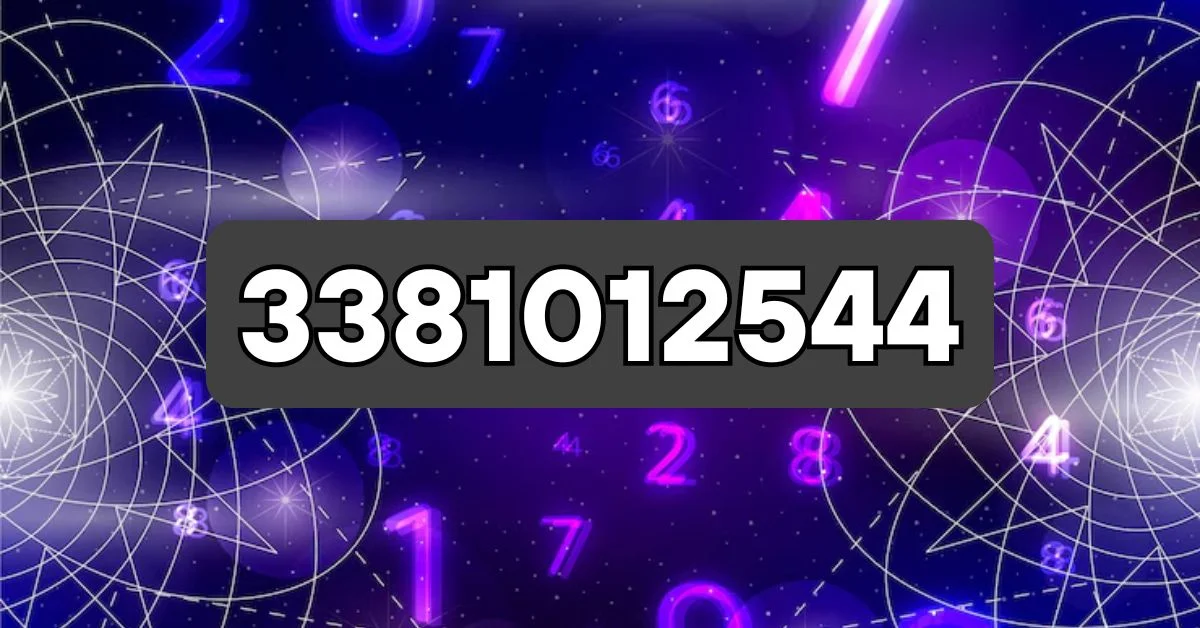In an age where digital identities, phone numbers, and coded identifiers dominate the landscape of our daily interactions, a sequence like 3381012544 may appear deceptively simple—yet it compels curiosity. Who—or what—is behind this number? Is it a phone number, a tracking ID, a scam, or a code embedded in a broader network system?
If you’ve searched for 3381012544, you’re not alone. Thousands of curious minds land on similar searches each month. They ask: Is it safe to answer a call from this number? Could it be tied to fraud? Or is it perhaps a government or corporate code? This article explores the plausible explanations for this enigmatic numeric string and provides updated, well-reasoned insights that help demystify what 3381012544 could truly be.
The Context of Numbers in Digital Communication
In our hyperconnected world, numbers serve more than just mathematical purposes. From QR codes and account verifications to service tags and caller IDs, numbers play a fundamental role in defining identity and access. Each numeric string can belong to a different context—phone communication, databases, tracking systems, or even embedded digital signatures.
When numbers like 3381012544 become widely searched or referenced online, they raise questions about their origin and significance. Are they unique identifiers, or do they relate to a pattern that affects many users?
READ MORE: Gocryptobet.com in 2025: Exploring the Future of Crypto Betting
Phone Numbers and Country Code Clues
A first logical assumption when encountering a number like 3381012544 is that it may be a telephone number. In particular, the ‘338’ prefix is notable. This could potentially indicate a mobile code, especially in certain European countries.
For instance:
- Italy, for example, uses ‘338’ as a prefix for mobile numbers associated with TIM (Telecom Italia Mobile).
- Thus, 3381012544 might be interpreted as an Italian mobile number.
That raises follow-up questions: Who’s calling from this number? Why would an Italian number be contacting users globally?
While country code clues give us a starting point, they don’t tell the whole story.
Could 3381012544 Be a Scam or Robocall Number?
Many who look up 3381012544 report suspicious activities tied to it, often claiming missed calls or automated messages. While these anecdotal reports don’t constitute hard evidence, they suggest the number might be associated with spam, robocalls, or potential scams.
Here are common signs of robocall or scam behavior:
- Calls are made at odd hours or repeated multiple times.
- The caller hangs up immediately upon answering.
- Voicemails are either blank or robotic.
- There is an attempt to extract personal or financial information.
If 3381012544 falls into this pattern, it could indicate a spoofed number—a tactic where scammers manipulate Caller ID to hide their true location.
The Role of Prefixes: What ‘338’ Might Suggest
Phone prefixes are not just random—they are engineered to indicate geographic or carrier-based origin.
In the case of ‘338’, its most significant modern usage comes from mobile telephony systems in Europe. However, prefixes can also be used internally in corporate or institutional systems as part of:
- Employee ID series
- Help desk or internal hotline numbers
- Customer service ticketing systems
It is also not unusual for some organizations to structure temporary or masked phone numbers in such a way that they begin with similar digits—allowing for quick identification of call origin or type.
READ MORE: HDToday.cc in 2025: A Streaming Platform Analysis in the Age of Fragmented Media
Other Possible Interpretations: Tracking, IDs, or Device Serial Numbers
There is a possibility that 3381012544 is not a phone number at all. It could instead be:
- A tracking ID from a logistics or delivery company.
- A device serial number used in manufacturing, often found in backend systems or returned as part of error logs.
- A reference number in an internal customer management database.
- A transactional code used by banks or financial institutions.
These uses often don’t surface publicly unless there’s a leak, user confusion, or an unintended public interaction. But once such a number is mistakenly shared or auto-generated in communications (emails, receipts, or phone notifications), it can cause a flurry of public searches.
Why So Many People Are Searching This Number
Search interest spikes around numerical strings like 3381012544 generally stem from:
- Unexpected calls or messages from the number.
- Mentions in emails or receipts—perhaps from retailers, banks, or delivery services.
- Red flags from spam detection apps, flagging it as suspicious.
- Public forum discussions—where users report shared experiences.
The search intent is typically protective in nature. Users want to ensure they are not being scammed, or to trace the source of an unknown message.
How to Respond If You Encounter This Number
If you’ve received a call or message from 3381012544, here’s how to handle it:
Step 1: Do Not Answer Immediately
Unless you’re expecting a call from Italy or a similar region, treat unknown numbers with caution.
Step 2: Use Reverse Lookup Tools
Numerous apps and services allow you to input a number and check community feedback.
Step 3: Block and Report
If it’s a robocall or phishing attempt, block the number on your device and report it to your local communications authority.
Step 4: Monitor Your Data
If you’ve ever engaged with a number like this, watch for suspicious bank or data activity.
The Future of Phone Number Transparency
The confusion around numbers like 3381012544 signals a broader issue: lack of transparency in digital communication systems. As technology evolves, so too must our tools for identifying and verifying contacts.
Governments and telecom companies are increasingly moving toward:
- Caller ID authentication systems (e.g., STIR/SHAKEN in the U.S.)
- AI-based spam filters
- Mandatory registration of business numbers
Such initiatives aim to reduce fraud and provide consumers with clearer insights into who is contacting them.
Final Thoughts
The rise in searches around 3381012544 illustrates a growing concern over anonymous digital contact. Whether it’s a legitimate number or part of a broader spoofing scheme, the key lies in informed skepticism and cautious engagement. Always verify, protect your information, and leverage available tools to guard against potential digital threats.
The mystery may never be entirely solved, but being aware of how such numbers operate is your first step in navigating today’s increasingly complex communication web.
Frequently Asked Questions
1. What country is the number 3381012544 from?
It likely originates from Italy, based on the mobile prefix ‘338’, commonly associated with TIM (Telecom Italia).
2. Is 3381012544 a scam number?
It could be. Many users report it as spam or a robocall. If unsure, avoid answering or interacting with it.
3. Can 3381012544 be a tracking or reference number?
Yes, it’s plausible that this number serves as a transactional ID or system-generated reference, not a phone number.
4. How do I check who owns the number 3381012544?
You can try reverse phone lookup services, but due to privacy laws, full ownership details are rarely public.
5. Should I block 3381012544?
If the number has made unsolicited contact or seems suspicious, it’s best to block it and report it to your carrier.









